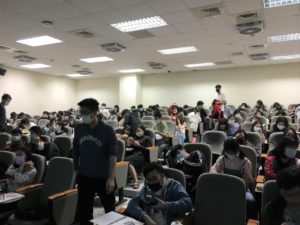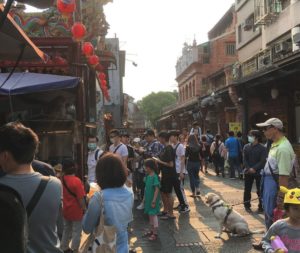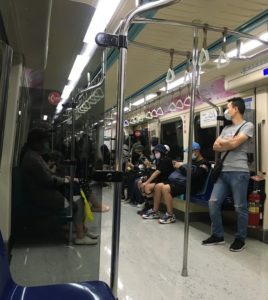


Riding the subway has never been more daunting in Taipei. If somebody clears his or her throat slightly at any given moment, those standing around would all have a glimpse of that passenger. I find myself to give up my seat easily only to avoid staying too close to others. When all the public transportation authorities first require every passenger to wear a face mask, local news often report disputes in which guests without such protection argue with the staff over their rights to enter the station. Now you just don’t hear about these incidents anymore. Covering your face in public has become a new norm and the least one can do to help everyone to carry on their everyday lives in the era of a pandemic.
Taiwan has kept its confirmed Covid-19 case number as low as under 400 so far primarily thanks to its prompt decision on border control followed by strict quarantine policies and contact tracking measures led by a national commend center overseen by the CDC in Taiwan. I would not downplay the significance of solidarity and seriousness of the whole society in preventing Covid as Taiwan learned the hard lessons from the 2003 SARS outbreak in Asia, and the public health systems has progressed largely from there. As I write this note, there is no any lockdown or stay-at-home orders since the situation is under control. Infected patients are treated in designated hospitals, and those with recent international travel history and contact history are subject to the quarantine or self-isolation measures. The CDC and the local authorities continue tracking every citizen returning from other countries. To date, almost all schools are open, businesses keep running, and public setting are occupied, albeit less heavily than before. Large-sized courses in the universities have mostly gone virtual or distant learning (like one course I teach). Inevitably, national and regional economies suffer significantly as a result of decreased outdoor activities. And yet, the social landscapes appear to be more regular compared to other countries right at this moment. Still, you can always smell distrust and insecurity in various public settings, both indoors and outdoors.
As the media and the government started promoting the idea of social distancing, citizens here also have to negotiate a somewhat strange public life experience. People mostly do not take social distancing too seriously here as we are more accustomed to wearing face masks as protective measures. Taiwanese believe that it is much safer and more pragmatic to put on your armor in a war zone. After all, Asian greeting customs already involve rather limited physical contact. The face mask has become an important symbol in terms of public health function, social presentations, and even diplomatic relationship. Now citizens here can use an APP for ordering face masks online. There are also vending machines for face masks. Our government has just donated millions of medical face masks to the US, Europe, and our South East Asian neighbors. People have been debating whether this is a worthy investment for gaining an observer status in the WHO’s World Health Assembly considering the local people are still stand in line and pay for the face masks at every pharmacy.
I cannot help noticing that some of the most neoliberal states all around the globe have a hard time opting for timely strategies dealing with this wave of pandemic. We tend to forget that one of the prominent features of neoliberalism is civil society, which is equally important as the other elements, such as a free market and privatization (Castree, 2008; Chiu 2019). Watching New York so heavily struck by the pandemic is heartbreaking as I have nothing but the deepest care for the city and friends there. I keep my fingers, toes, and everything crossed for all New Yorkers and for the city proven to have the resilience to recover from major crises. If there is any lesson that I learned from observing how Covid-19 has impacted the world, that is, public life is an indispensable part of urban experience. Seeing quarantined people stand on their balconies to cheer for one another, sneak out from home for fresh air, and walk their dogs more often than ever, we learn that built and natural environments for vital public life still count so much. Public space is never something to blame when it comes to explaining the pandemic. Rather, it is precisely the etiquette of public behaviors, such as social distancing, wearing proper protections, that built on the senses of solidarity and civil society, is likely to make all cities safe and enjoyable again.
Chihsin Chiu, Ph.D.
Associate Professor
Department of Real Estate and Built Environment,
National Taipei University, Taiwan
References
Castree, Noel (2008). Neoliberalising Nature: The Logics of Deregulation and Reregulation. Environment and Planning A: Economy and Space, 40, 131-152.
Chiu, Chihsin & Christopher Giamarino (2019). Creativity, conviviality and civil society in neoliberalizing public space: Changing politics and discourses in skateboarder activism from New York City to Los Angeles. Journal of Sport & Social Issues﹐43(6), 462-492.


